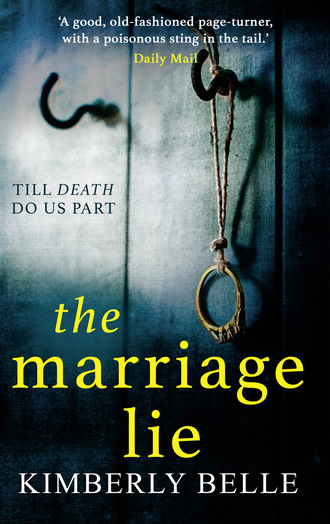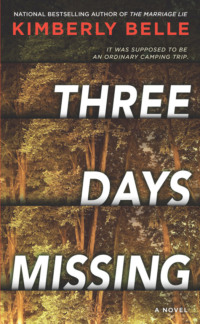
Полная версия
The Marriage Lie
I nod, my gaze flitting to the images on my screen. Those poor people. Their poor families.
“Somebody at this school is going to know somebody on that plane,” Ava says. “You just wait.”
Her words skitter a chill down my spine, because she’s right. Atlanta is a big city but a small town, one where the degrees of separation tend to be short. The chance that someone here is connected in some way to one of the victims isn’t small. I suppose the best thing I can hope for is that it’s not a family member or close friend.
“The students are anxious,” Ted says. “Understandably so, of course, but I don’t think we’ll get any classroom work done today. With your help, though, I’d like to turn this tragedy into a different kind of learning opportunity for everyone. Create a safe place for our students to talk about what happened and to ask questions. And if Miss Campbell here is correct, that someone at Lake Forrest lost a loved one in the crash, we’ll already be in place to provide whatever moral support they need.”
“That sounds like a great idea.”
“Excellent. I’m glad you’re on board. I’ll call a town hall meeting in the auditorium, and you and I will tag-team the discussion.”
“Of course. Just give me a minute or two to pull myself together, and I’ll be right there.”
Ted raps a knuckle on the door and hustles off. With lit class officially canceled, Ava picks up her backpack, rifling through it for a few seconds while I dig a compact out of my desk drawer.
“Here,” she says, dumping a fistful of designer makeup tubes onto my desk. Chanel, Nars, YSL, Mac. “No offense, but you look like you need them way more than I do.” She softens her words with a blinding smile.
“Thanks, Ava. But I have my own makeup.”
But Ava doesn’t pick up the tubes. She shifts from foot to foot, one hand wringing the strap of her backpack. She bites her lip and glances at her oxford shoes, and I think under all that bluster and bravado, she might actually be shy. “I’m really glad it wasn’t your husband’s plane.”
The relief this time is a slow build, wrapping me in warmth like Will’s sleeping body did just this morning. It settles over me like sunshine on naked skin. “Me, too.”
As soon as she’s gone, I reach for my phone, pulling up the number for Will’s cell. I know he can’t pick up for another hour or so, but I need to hear his voice, even if it’s only a recording. My muscles unwind at the smooth, familiar sound.
This is Will Griffith’s voice mail...
I wait for the beep, sinking back in my chair.
“Hey, babe, it’s me. I know you’re still in the air, but a plane just crashed after taking off from Hartsfield, and for about fifteen terrifying seconds I thought it might have been yours, and I just needed to...I don’t know, hear for myself that you’re okay. I know it’s silly, but call me as soon as you land, okay? The kids are kind of freaked, so I’ll be in a town hall, but I promise I’ll pick up. Okay, gotta run, but talk to you soon. You’re my very favorite person, and I miss you already.”
I drop my phone into my pocket and head for the door, leaving Ava’s makeup where she dumped it, in a pile on my desk.
3
Seated next to me on the auditorium stage, Ted smooths a hand down his tie and speaks to the room filled with high-schoolers. “As you all know, Liberty Air Flight 23 traveling from Hartsfield-Jackson International Airport to Seattle, Washington, crashed a little over an hour ago. All 179 passengers are presumed dead. Men, women and children, people just like you and me. I’ve called us here so we can talk about it as a group, openly and honestly and without judgment. Tragedies like this one can make us all too aware of the dangers in our world. Of our own vulnerabilities, of just how fragile life can be. This room is a safe space for us to ask questions and cry and whatever else you need to do to process. Let us all agree that what happens in this auditorium stays in this auditorium.”
Any other head of high school would hold a school-wide moment of silence and tell the kids to get back to work. Ted knows that for teenagers, catastrophe takes precedence over calculus any day, and it’s because he sees everything, good or bad, as a learning opportunity that the students follow him without question.
I look out over the three hundred or so kids that make up Lake Forrest’s high-school student body, and as far as I can tell, they’re split pretty solidly down the middle—half the students are freaked by the images of an airplane filled with their maybe-neighbors falling from the sky, the other half giddy at an entire afternoon of canceled classes. Their excited chatter echoes through the cavernous space.
One girl’s voice rises to the top. “So this is kind of like group therapy?”
“Well...” Ted sends me a questioning look, and I dip my head in a nod. If there’s one realm Lake Forrest students feel comfortable navigating, it’s therapy, group or otherwise. Ours are the type of kids who have their therapists’ cells on speed dial. “Yes. Exactly like group therapy.”
Now that they know what’s coming, the students seem to relax, crossing their arms and slumping back into their plush seats.
“I heard it was terrorists,” someone calls out from the back of the auditorium. “That ISIS has already come out and said they did it.”
Jonathan Vanderbeek, a senior about to graduate by the skin of his teeth, twists around in his front-row seat. “Who told you that, Sarah Palin?”
“Kylie Jenner just re-Tweeted it.”
“Brilliant,” Jonathan says, snorting. “Because the Kardashians are experts when it comes to our nation’s security.”
“Okay, okay,” Ted says, calling everyone back to order with a few taps to the microphone. “Let’s not escalate the situation by repeating rumors and conjecture. Now, I’ve been watching the news carefully, and beyond the fact that a plane crashed, there really is no news. Nobody has said why the plane crashed, or who was on it when it did. Not until they’ve contacted the next of kin.” His last three words—next of kin—hit the room like a firebomb. They hang in the air, hot and heavy, for a second or two. “And moving forward, let’s all agree that there are more credible news sources than Twitter, shall we?”
A snicker comes from the front row.
Ted shakes his head in silent reprimand. “Now, Mrs. Griffith has a few things she’d like to say, and then she’ll be leading us in a discussion. In the meantime, I’ll be watching the CNN website on my laptop, and as soon as the airline releases any new information, I’ll pause the conversation and read it aloud so we’ll all have the same up-to-date information. Does that sound like a good plan?”
Nods all around. Ted passes me the mic.
* * *
I wish I could say I spent the next few hours staring at my phone, watching for Will’s call, but at seventy-six minutes postcrash, only ten minutes into our discussion and a good fifteen before the airline was scheduled to make its first official statement, CNN reports that the Wells Academy high-school lacrosse team, all sixteen of them and their coaches, were among the 179 victims. Apparently, they were on their way to a mid-season tournament.
“Omigod. How can that be? We just played them last week.”
“Last week, you idiot. You just said so yourself. Which means they had plenty of time between then and this morning to get on a plane.”
“You’re the idiot, idiot. I’m talking about how we lost the game that won Wells a tournament spot. Do the math.”
“Hold up,” I say, the words slicing through the auditorium before the argument can escalate further. “Disbelief is a normal reaction to news of a friend’s death, but anger and sarcasm are not good coping mechanisms, and I’m pretty sure every one of y’all in here knows it.”
The kids exchange contrite looks and slump deeper into their seats.
“Look, I get that it’s easy to hide behind negative emotions rather than confront what a close call our friends and fellow students had,” I say, my tone softening. “But it’s okay for you to be confused or sad or shocked or even vulnerable. These are all normal reactions to such shocking news, and having an open and honest conversation will help all of us work through our feelings. Okay? Now, I bet Caroline here isn’t the only one here thinking back to the last time she saw one of the Wells players. Was anyone else at the game?”
One by one, hands go up, and the students begin talking. Most of the accounts are no more relevant than same field, same time, but it’s clear the kids are spooked by the proximity, especially the lacrosse players. If they had won that game, if Lake Forrest had been the school with a slot in that tournament, it could have just as easily been our students on that plane. Corralling the conversation takes every bit of my concentration until just after one, when we break for a late lunch.
The students file out, and I pull my phone from my pocket, frowning at the still empty screen. Will landed over an hour ago, and he still hasn’t called, hasn’t texted, hasn’t anything. Where the hell is he?
Ted drapes a palm over my forearm. “Everything okay?”
“What? Oh, yes. I’m just waiting on a call from Will. He flew to Orlando this morning.”
Ted’s eyes go huge, and his cheeks quiver in sympathy. “Well, that certainly explains your expression when I came to your office earlier. You must have had quite a scare.”
“Yes, and poor Ava bore the brunt of it.” I waggle my phone in the air between us. “I’m just going to see if I can’t track him down.”
“Of course, of course. Go.”
I skitter off the stage and up the center aisle, pulling up Will’s number before I’ve stepped through the double doors. Lake Forrest is set up like a college campus, with a half-dozen ivy-covered buildings spread across an acre campus, and I take off down the flagstone path that leads to the high-school building. The rain has stopped, but leaden clouds still hang low in the sky, and an icy wind whips chill bumps over my skin. I pull my sweater tight around my chest and hustle up the stairs to the double doors, pushing into the warmth right as Will’s cell shoots me to voice mail.
Dammit.
While I wait for the beep, I give myself a pep talk. I tell myself not to worry. That there’s a simple explanation for why he hasn’t called. The past few months have been particularly stressful at work, and he hasn’t been sleeping well. Maybe he’s taking a nap. And the man is easily distracted, a typical techie who can never seem to focus on one thing at a time. I imagine him punching in my number, then forgetting to push Send. I picture him hobnobbing with conference bigwigs by the hotel pool, oblivious to the buzzing phone in his hand. Or maybe it’s as simple as his battery died, or he forgot his cell on the plane. I think of all these things, and I can almost taste the joy.
“Hey, sweetie,” I say into the phone, trying not to let the worry seep into my tone. “Just wanted to check in and make sure all is well. You should be at your hotel by now, but I guess the reception in your room is crappy or something. Anyway, when you get a second, call me. This crash has got me a little antsy, and I really want to hear your voice. Okay, talk soon. You’re my very favorite person.”
In my office, I head straight for my computer and pull up my email program. Will sent me the conference details months ago, but there are more than three thousand emails in my inbox and no good system for organizing them. After a bit of searching, I find the email I’m looking for:
From: w.griffith@appsec-consulting.com
To: irisgriffith@lakeforrestacademy.org
Subject: FW: Cyber Security for Critical Assets: An Intelligence Summit
Check me out! I’m Thursday’s keynote speaker. Let’s just hope they don’t all fall asleep, kind of like you do whenever I talk about work. xo
Will M. Griffith
Sr. Software Engineer
AppSec Consulting, Inc.
My skin tingles with relief, and I feel vindicated. The words are right here, in black and white. Will is in Orlando, safe and sound.
I click on the attachment, and a full-page conference flyer opens. Will’s head shot is about halfway down, next to a blurb advertising his expertise on all things access risk management. I hit Print and scribble the name of the conference hotel on a Post-it note, then return to my internet browser for the telephone number. I’m copying it down when my phone rings, and my mother’s face lights up the screen.
A stab of uneasiness pings me in the chest. A speech pathologist, Mom knows what working in a school environment is like. She knows my days are crazy, and she never disturbs me at work unless there’s a life-and-death situation. Like the time Dad hit a pothole with his front bike tire and flipped a three-sixty onto the asphalt, landing so hard he cracked his collarbone and split his helmet clean down the middle.
Which is why I answer her call now with “What’s wrong?”
“Oh, sweetheart. I just saw the news.”
“About the crash? I know. We’ve been dealing with it all day here at school. The kids are pretty freaked.”
“No, that’s not what I meant. Well, not exactly... I meant Will, darling.”
Something in the way she says it, in the careful and roundabout way she’s asking but not asking about Will, soldiers every hair on my body to attention. “What about him?”
“Well, for starters, where is he?”
“In Orlando for a conference. Why?”
The force of Mom’s sigh into the speaker pierces my eardrum, and I know how much she’s been holding back. “Oh, thank God. I knew it couldn’t be your Will.”
“What are you talking about? Who couldn’t be my Will?”
Her reply gets buried under a student’s loud interruption. “Mr. Rawlings told me to tell you they just released a list of names.” She screams the words into my office, as if I’m not sitting right here, three feet away, and on the phone. I shush her and shoo her off with a hand.
“Mom, start over. Who’s not my Will?”
“The William Matthew Griffith they’re saying was on that plane.”
Not my husband bubbles up from the very core of me, from somewhere deep and primitive. My Will was on a different plane, on a whole different airline even. And even if he wasn’t, Liberty Airlines would have already called. They wouldn’t have released his name without notifying me—his wife, his very favorite person on the planet—first.
But before I can tell my mother any of these things, my phone beeps with another call, and the words on the screen stop my heart.
Liberty Airlines.
4
With a shaking hand, I hang up on my mother and pick up the call from Liberty Airlines.
“Hello?” My throat is tight, and my voice comes out raspy and faint.
“Hello, may I please speak with Iris Griffith?”
I know why this woman is calling. I know it from the way she says my name, from her carefully neutral tone and businesslike formality, and the breath sticks in my throat.
But she’s wrong. Will is in Orlando.
“Will is in Orlando,” I hear myself say.
“Pardon me... Is this the number for Iris Griffith?”
What would happen if I said no? Would it stop this woman from saying the words I know she called to say? Would she hang up and call the other William Matthew Griffith’s wife?
“I’m Iris Griffith.”
“Mrs. Griffith, my name is Carol Manning of Liberty Airlines. William Matthew Griffith listed you as his emergency contact.”
Will is in Orlando. Will is in Orlando. Will is in Orlando.
“Yes.” I clutch my stomach with an arm. “I’m his wife.” Am his wife. Am.
“Ma’am, I deeply regret to inform you that your husband was a passenger on this morning’s Flight 23, which crashed en route from Atlanta to Seattle. It is presumed that none of those on board survived.” She sounds like a robot, like she’s reading from a script. She sounds like Siri calling to tell me my husband is dead.
My muscles stop working, and I go down. My torso falls forward onto my own lap, my body bending in half like a snapped twig. The impact knocks the wind right out of me, and the breath leaves me in a great moan.
“I know this must come as a shock, and I assure you Liberty Airlines is here to support you however and whenever you need. We’ve established a dedicated hotline number and email address for you to contact us anytime, day or night. Regular updates will also be available on our website, www.libertyairlines.com.”
If she says anything more, I don’t hear it. The phone clatters to the floor and right there, in the middle of my cluttered office, my doorway filling with wide-eyed students, I slide off my chair and sob, pressing both hands to my mouth to stifle the sound.
* * *
Two large shoes step into my field of vision. “Oh, Iris. I just heard. I’m so, so sorry.”
I look up through my hair at Ted, at his concerned brow under those canine curls, and I weep with relief. Ted is a fixer. He’ll know what to do. He’ll call somebody who will tell him it was the wrong Will, the wrong plane, I’m the wrong wife.
I try to pull myself together, but I can’t, and it’s then I notice that my office is crawling with high-schoolers. I already heard them gathering in the hall outside my doorway, low tones and whispered words I wasn’t supposed to hear. Words like husband, plane, dead, and I know they’ve heard the news.
No. Just this morning, while I was filling our travel mugs with coffee, Will checked the weather in Orlando on his phone. “High of eighty-seven today,” he said with a shake of his head. “And it’s not even summer. This is why we will never live in Florida.”
Ava watches me with tears in her eyes. “Will is in Orlando,” I say to her, and her face flashes pity.
I’m embarrassed to have her see me like this, to have any of them see me like this, a crumpled, snotty mess on the floor. I cover my face with my hands and wish they’d go away. I wish all of them would just leave me alone. My open-door policy can suck it.
“Here, let me help you up.” Ted hauls me off the floor and deposits me on my chair.
“Where’s my phone? I want to try Will again.”
He leans down, picks up my phone from the floor, passes it to me. Nine missed calls. I taste bile when I see they’re all from my mother. None, not even one, from Will.
“Guys, give us a little privacy, will you?” Ted glances over his shoulder. “Shut the door on your way out.”
One by one, the kids file out, mumbling their condolences. Ava runs a light finger down my arm on her way past, and I flinch. I don’t want her sympathy. I don’t want anyone’s sympathy. Sympathy would mean what that woman told me is true. Sympathy would mean my Will is dead.
Once everyone is gone and we’re alone, Ted drapes a palm over my shoulder. “Is there someone I can call?”
Call! I was about to call the hotel. My gaze lands on the conference flyer, and I snatch it from my printer, wave it in Ted’s face. “This! This right here proves Will is in Orlando. He’s tomorrow’s keynote. He wasn’t on the plane to Seattle. He was on one to Orlando.” Hope blooms in my chest.
“Did he check into the hotel?” Ted says, but in a tone that says he’s humoring me.
With shaking fingers, I find the Post-it where I scribbled the number and punch it into my phone. I can tell that Ted’s holding out little hope, that he thinks this exercise is a futile waste of time, and the blatant mollification that lines his face is too much for me to bear. I stare down at my desk instead, concentrating instead on the marks and scratches that crisscross its surface. The phone rings, then rings again.
After an eternity, a perky female voice answers. “Good afternoon, Westin Universal Boulevard. How may I be of service?”
“Will Griffith’s room, please.” The words tumble out of me, jagged and raw and way too fast, like an auctioneer hyped on crack.
“My pleasure,” the receptionist chirps in my ear. I’m sure she gets crazed spouses on the line all the time, women hunting down their wayward boyfriends or philandering husbands. Westin probably has an entire training manual on how to deal with callers like me. “Griffith, you said?”
“Yes, Will. Or it could be under William, middle initial M.” I drag a deep breath and try to calm myself, but my leg is bouncing, and I can’t stop shivering.
Ted shrugs out of his jacket and drapes it over my shoulders. I know he means well, but the gesture feels far too personal, and the fabric smells like Ted, fragrant and foreign. I want to rip the jacket off and chuck it out the window. I don’t want any man’s clothing touching my body but Will’s.
The woman clicks around a keyboard for a few seconds. “Hmm. Sorry, but I’m not finding a reservation for Mr. Griffith.”
I choke on a sob. “Check again. Please.”
There’s a long pause filled with more clicking, more humoring. Dread begins to burrow under my skin like a parasite, slow and steady, eating away at my certainty.
“Are you positive it’s this Westin property? We have one in Lake Mary, just north of the city. I can get you the number, if you’d like.”
I shake my head, blinking away fresh tears in order to read the hotel information at the bottom of the flyer. “I’m looking at the conference flyer right now. It says Universal Boulevard.”
Her voice brightens. “Oh, well, if he’s here for a conference, then perhaps I can get a message to the organizer’s point of contact. Which conference?”
“Cyber Security for Critical Assets: An Intelligence Summit.”
She hesitates only a second or two, but long enough that bile builds in my throat. “I’m very sorry, ma’am, but there’s no conference by that name at this hotel.”
I drop the phone and throw up into my wastebasket.
* * *
Claire Masters, a colleague from the admissions office across the hall, drives me home. Claire and I are friendly enough, but we’re not friends, though I don’t have to ask why I’m here, buckled into the passenger’s seat of her Ford Explorer instead of someone else’s car. Early last year, Claire lost her husband to Hodgkin’s, and now, whether she volunteered to drive me home or Ted asked her to, the reason is clear. If anyone will understand what I’m going through, it’s another widow.
Widow. I’d throw up again, but my stomach is empty.
I turn and stare out the window, watching the familiar Buckhead strip malls fly by. Claire drives slowly, her hands at ten and two, and she doesn’t say a word. She keeps her mouth shut and her gaze on the traffic in front of her, and as much as I detest being lumped into her tragic category, at least she knows that the only thing I want is to be left alone.
My phone buzzes on my lap. My mother, calling for what must be the hundredth time. Guilt pricks at my insides. I know it’s not fair to keep avoiding her, but I can’t talk to her right now. I can’t talk to anybody.
“Don’t you want to get that?” Claire’s voice is high and girlish, and it slices through the silence like a serrated knife.
“No.” It takes all my energy to speak around the boulder on my chest.
Her gaze bounces between me, my phone and the traffic before us. “Take it from me, your mother is losing her mind right now.”
I wince at her knowing tone, at the way she’s putting the two of us on the worst kind of team. “I can’t.” My voice cracks the last word in two, because talking to Mom would mean saying those awful words out loud. Will is gone. Will is dead. Saying the words would make this thing real.
The phone stops, then two seconds later, starts again.
This time, Claire plucks the phone from my lap and swipes the bar to pick up. “Hi, this is Claire Masters. I’m one of Iris’s colleagues at Lake Forrest. She’s sitting right beside me, but she’s not quite ready to talk.” A pause. “Yes, ma’am. I’m afraid that’s correct.” Another pause, this time longer. “Okay. I’ll make sure to tell her.” She hangs up and places the phone gently back onto my legs. “Your parents are on their way. They’ll be here before dark.”
I’d thank her, but I can’t muster up the energy. I stare out the window and try to picture it, my Will in a field of smoking wreckage, with luggage and debris and charred, twisted chunks of metal scattered all around, but I can’t. It seems incomprehensible, as abstract to me as a concept from Dr. Drukker’s AP physics class. Will was going to Orlando, not Seattle. He can’t be dead. It just isn’t possible.








